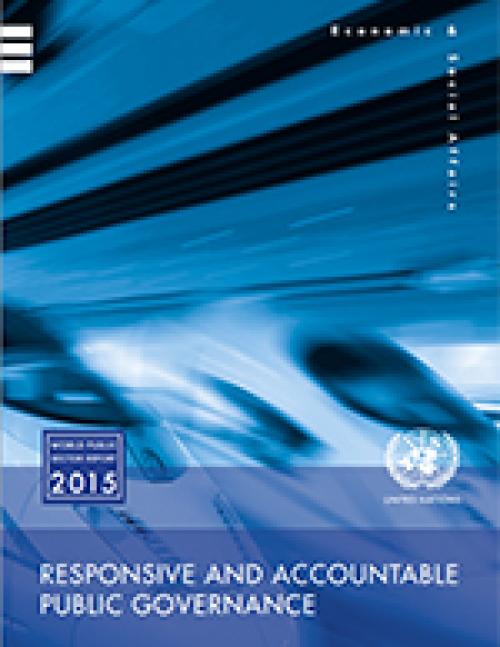The 2015 World Public Sector Report (WPSR) published, titled Responsive and Accountable Public Governance, analyses the most salient features of public governance for enabling inclusive economic growth, social justice and environmental sustainability.
Heads of state and government have adopted a new development agenda to guide sustainable development efforts for the next 15 years. Member States will have the responsibility of turning this collective vision of sustainable development into reality for their citizens. These aspirations will not be realized without a transformation of public governance to support integration among different levels, spheres and sectors. Policies, strategies, programmes, activities and resources need to be deployed coherently, in line with the principles of responsiveness and accountability.
In doing so, governments will need to overcome many challenges. They will need to respond efficiently and effectively to people’s increasing demands, and develop competent, diverse and ethical public servants and inclusive, participatory and accountable institutions. They will need to engage citizens and empower communities as well as reach out through multi-channel service delivery and e-participation.
Governance, a priority for development
Governance is both an enabler and an outcome of development. Responsive and accountable public governance begins with the state leadership working with the citizens to formulate and agree on a vision for the sustainable development of the country. Several lessons in this regard were learned from the implementation of the Millennium Development Goals. These include the need for responsive public leadership, inclusive growth, decent employment and social protection. Another key lesson is the need for allocating more resources for essential services and ensuring access for all leaving “no one behind”.
Responsive governance
Responsiveness is about meeting efficiently and effectively people’s needs. Responsiveness also requires ensuring quality, quantity and promptness of public services as well as equality and equity in their provision and greater access to them. A competent, diverse and ethical public service is needed to implement coherent and integrated public policies. Public servants need to engage with citizens and strive to help communities to be empowered to articulate both their problems and possible solutions. Hence, collaboration with non-state actors (multisector cooperation) and increased public participation are a necessity for responsive action in governance for development. New measures that harness the outreach power of ICT can be integrated with the traditional ones to provide multichannel service delivery. Additionally, all governance actors can tap into technical and social innovations, such as e-participation, for meeting the challenges of sustainable development.
Accountable governance
Establishing and integrating stronger accountability, anticorruption and regulatory frameworks are essential towards the delivery of the 2030 Agenda for Sustainable Development. An accountable organizational culture deters waste and mismanagement of resources and corruption. Accountability for performance serves to guide, monitor and evaluate public institutions and programmes. Building capacity for financial and performance accountability is particularly important for building trust. Supreme Audit Institutions, and other independent oversight bodies, can provide valuable feedback and advice to assist public institutions to become more transparent and accountable. Member States may also capitalize on the e-tools and open government data potential to enhance their interaction with citizens in order to strengthen information sharing and participation, which contributes to more accountable governance.
 Welcome to the United Nations
Welcome to the United Nations

